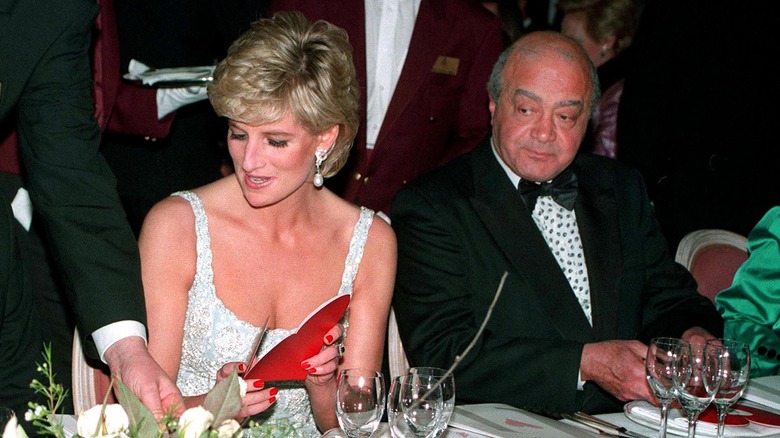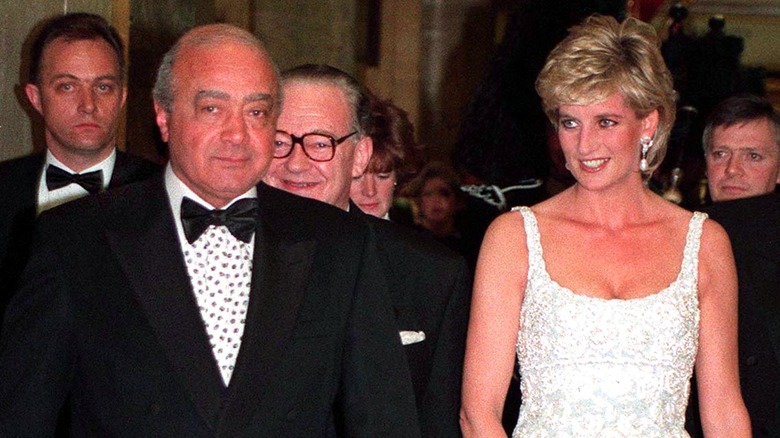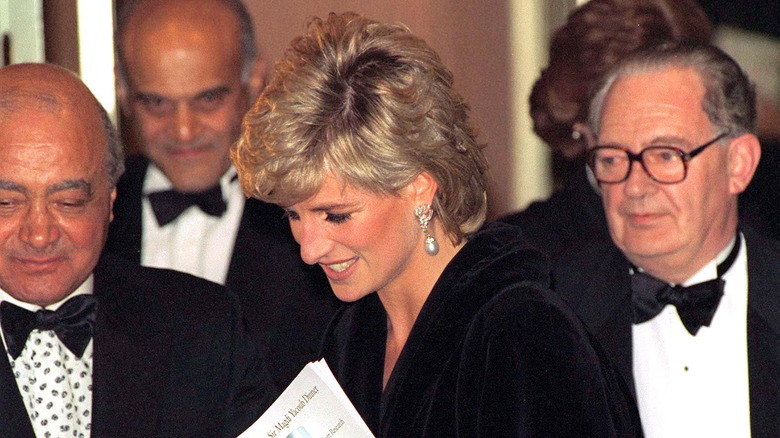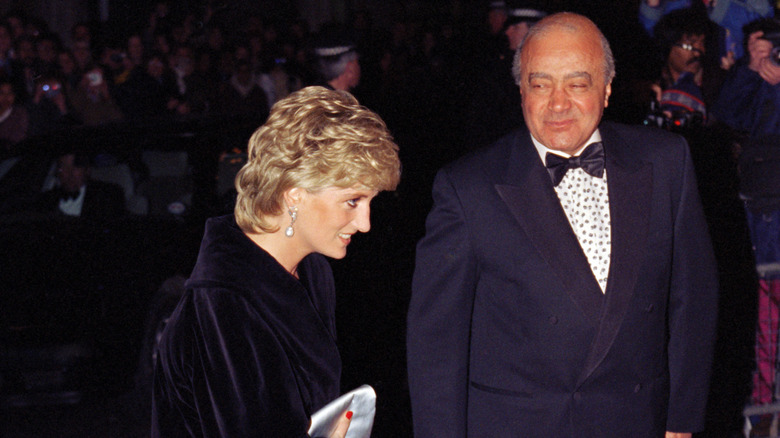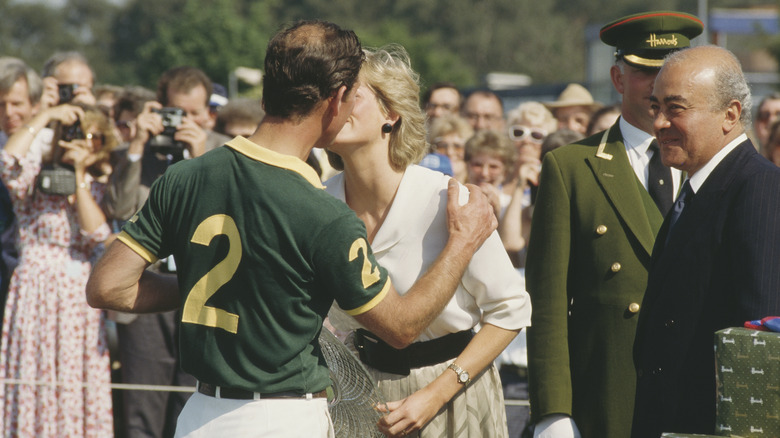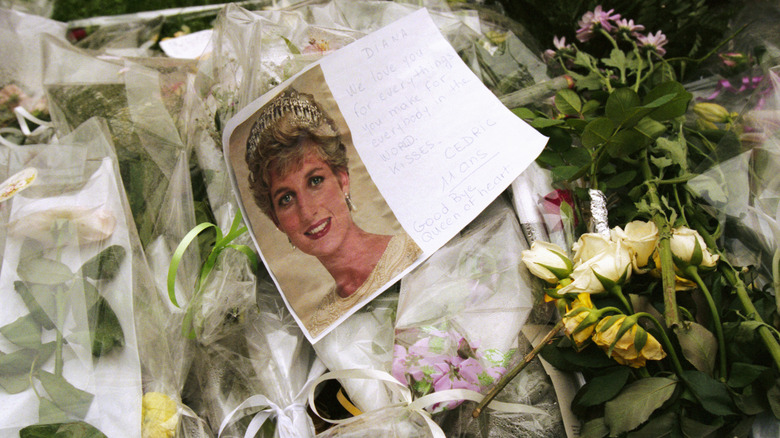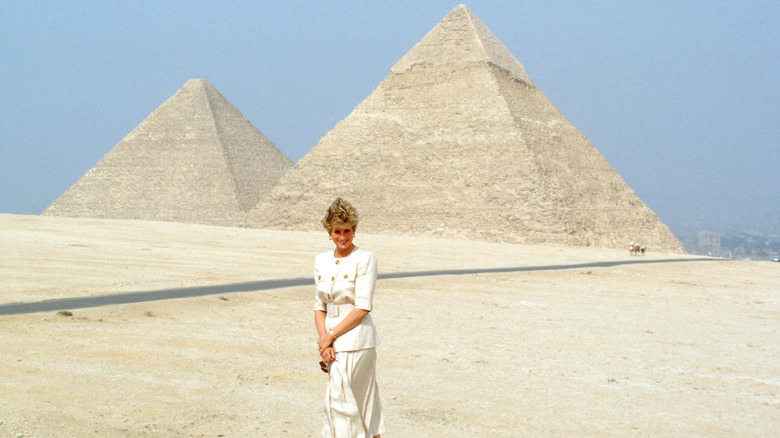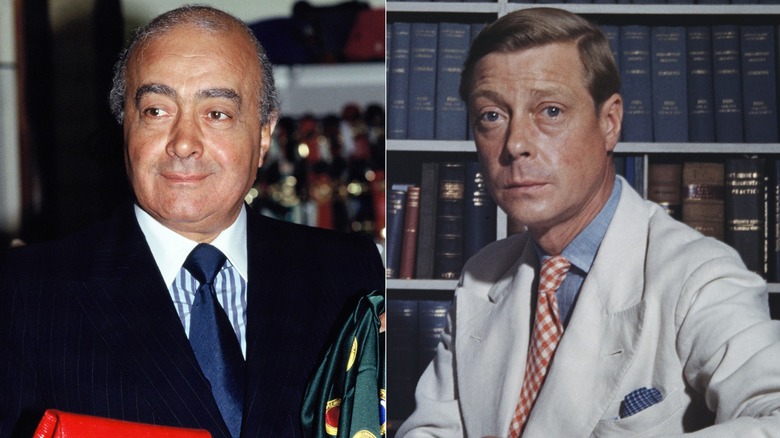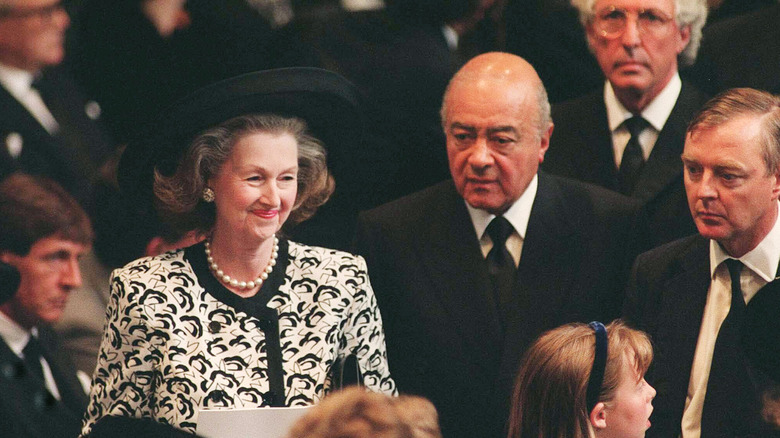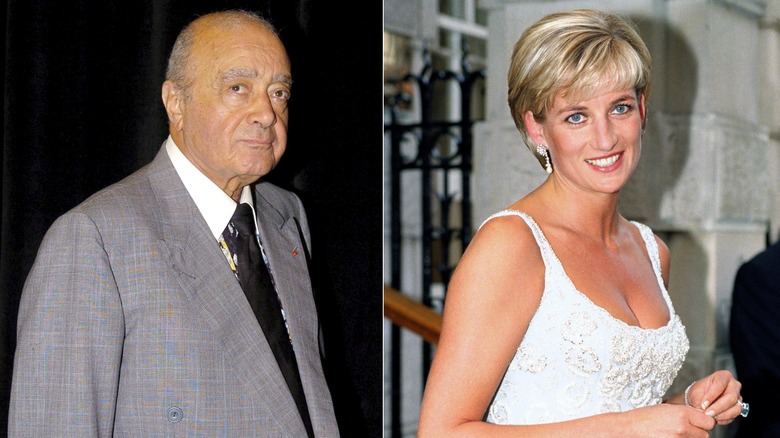Inside Mohamed Al-Fayed's Relationship With Princess Diana
Mohamed Al-Fayed, a captivating and often controversial figure, emerged as a prominent name in British business and society during the 1990s. Hailing from Alexandria in Egypt, he assumed ownership of London's iconic Harrods department store and the opulent Ritz Hotel in Paris.
Within the British social landscape, Mohamed's presence was marked by an unwavering determination to ascend the ranks of upper-class England and forge connections with the affluent royal family. This relentless pursuit stemmed from his early life in Egypt, where he faced poverty and hardship.
As the proprietor of Harrods, an institution steeped in tradition, Mohamed Al-Fayed wielded significant influence in London, pioneering the evolution of consumer culture. His growing prominence and wealth led to interactions with royalty and sponsorship of charitable events, firmly situating him within the orbit of the British royal family. These connections ultimately paved the way for his association with Princess Diana. Here's inside the relationship of a hotel owner and a princess.
Their friendship started when Mohamed began sponsoring royal charities
Mohamed Al-Fayed met Princess Diana through his sponsorship of various charitable endeavors attended by the British royal family. While the precise moment of their initial encounter remains shrouded in ambiguity, the web of events and interactions that followed hinted at a deeper connection between the two. Mohamed's involvement in these philanthropic circles afforded him opportunities to engage with the princess in settings that blurred the lines between business, nobility, and benevolence.
Michael Cole — the director of public affairs at Harrods during the '90s — offered insights into the dynamic between Mohamed and Diana, as reported in a 1995 Vanity Fair article. Cole described their interactions as something that transcended the traditional boundaries that often define relations between the elite and the public, giving rise to speculations about the nature of their relationship.
Mohamed's role as a sponsor not only demonstrated his commitment to charitable causes but also introduced him to a world where his influence intersected with that of the British royal family. Even so, Mohamed never appeared to truly belong among the elite. In 1995, Alan Frame told Vanity Fair, "Nobody quite accepts him. We're still a class-ridden society. He sponsors lots of things involving the royal family, and he's still not accepted." Although never truly 'in,' these social connections began to unfold a story that would eventually shape the trajectory of both Mohamed's life and his relationship with Diana.
Mohamed's friendship with Diana coincided with his desperation to be part of British high society
Had Princess Diana and Dodi Al-Fayed's relationship endured, it would have been a tale of sweet revenge against the British royal family, whom Diana believed had mistreated her. Their potential marriage would have forced the royals to accept the gaudy wealth of the Al-Fayed family into the heart of the aristocracy. Moreover, the British establishment, which had dismissed Mohamed Al-Fayed's pleas for acceptance, would have been compelled to acknowledge him as the patriarch of Diana's new family.
However, fate had different plans. The untimely demise of Dodi Al-Fayed ended his father's aspirations of integrating with royal circles and his chance to be a man of prominence in England. His anguish was palpable, as described by Michael Cole, the spokesman for Mohamed. The loss of his son left him desolate and broken. "With the death of his son, Fayed has lost his entree to royal circles and his last, best chance to become an Englishman," Cole said via The Washington Post in 1997. "He's utterly desolate, this is cruelty laid upon cruelty."
Mohamed hoped to become Diana's father-in-law
Father to Dodi Al-Fayed, Princess Diana's paramour, Mohamed Al-Fayed remains resolute in his belief that their promising love story was deliberately extinguished to prevent their union, fueled by prejudices against a Muslim marriage. Despite the ensuing societal backlash and the loss of his royal warrants, Mohamed clings to his assertion, viewing himself as a guardian of a hidden truth.
Mohamed's transformation from a brash billionaire to a reclusive elder offers a glimpse into a life dominated by loss. His unwavering pilgrimage to his son's mausoleum and the quiet moments spent in Diana's former Park Lane flat reveal a man enmeshed in memories of love and longing.
Mohamed not only lost a son but also a potential new daughter-in-law and friend. "Mohamed believes they were in love and were going to announce their engagement in London the day after the tragedy," a close friend told The Sun in 2017. "He will never get over the death of his son, or that of the Princess — because of the love he had for both."
Mohamed was entrusted by the Spencer family
Mohamed Al-Fayed's propensity for control was evident in his actions like the time he took over the Harrods cold cuts counter to ensure the proper slicing of salami. This control extended to matters of the heart as well, as he orchestrated the romantic possibility between Princess Diana and Dodi Al-Fayed. He was closely connected to Diana's family, having been a friend of her father, the eighth Earl Spencer. Mohamed even secured a position for Diana's stepmother, Raine Spencer, on the board of Harrods International.
Max Clifford, a London PR representative, and Mohamed's friend, revealed that Diana's father entrusted Mohamed with the care of his family before his passing. This established a level of comfort between Diana and the Al-Fayeds, and their relationship blossomed naturally. Dodi and Diana's engagement was on the brink of being announced, a culmination of their affection, as mentioned by Dodi's step-uncle, Hussein Yassin. Tragically, this future of love and union was cut short when the chauffeured Mercedes crashed in a Paris tunnel.
Directly following the senseless death of Princess Diana and Dodi, Mohamed issued a prepared statement per The Washington Post. "I will never be able to reconcile myself to the needless and cruel deaths of two people who were so vibrant, generous and full of life," Mohamed said before going into seclusion. "God took their souls to live together in paradise. Now they have peace."
Mohamed questioned the details surrounding Dodi and Diana's tragic deaths
Following the shattering events of Princess Diana and Dodi Al-Fayed's untimely deaths, Mohamed Al-Fayed embarked on a relentless campaign to challenge the official narrative surrounding the fatal car crash. Mohamed assembled a team of investigators and legal experts to meticulously examine the details of the crash. His determination to uncover the real circumstances behind the crash led to a series of legal battles and appeals. With a conviction that extended beyond mere speculation, Mohamed's campaign was marked by his outspoken assertion that the car crash was not an accident but rather a calculated event with potentially sinister motivations.
Mohamed's quest for answers and justice became a focal point of his identity, propelling him into the spotlight as a prominent figure who refused to accept the official account. His efforts, while met with skepticism by some, demonstrated an unyielding determination to honor the memory of his son and Princess Diana and to seek closure that aligned with his own beliefs and convictions.
In 2017, a close family friend reported to The Sun, "Mohamed remains confident that information will emerge confirming his belief that Dodi and Diana were deliberately killed by the security services. He always says, 'My son was slaughtered,' and he believes that was because the Establishment would not allow a Muslim to be married to the woman who would be the mother of the future king."
Princess Diana had visited Egypt, Mohamed's homeland
As a member of the royal family, Princess Diana traveled the world. Some countries, like Egypt, she visited more than once. Diana's first trip to Egypt was in 1981 with then-Prince Charles as part of a honeymoon cruise. The couple didn't spend too much time in Egypt, though, as their trip was only 11 days, and they also stopped in Algeria, Tunisia, Italy, and Greece while on the cruise.
Just over a decade later, Diana returned to Egypt, this time on a solo tour. It was during this trip that one of the most famous photographs of the princess was taken — her in front of the pyramids. "She said to me, 'When people ask me to stand in front of places like the Pyramids, I feel awkward, especially when I'm on my own ... I don't like posing. But I will do it really quickly — and once — and you can grab the picture,'" Diana's personal photographer Anwar Hussein said of the photograph, as reported by People.
Though it hasn't been reported definitively, it is highly unlikely that Diana saw Mohamed Al-Fayed during either of her trips to Egypt. Though Egyptian by birth and proud of his nationality, Mohamed moved to Europe in the late 1950s, and he was probably not in Egypt while Diana was there. Furthermore, Diana likely hadn't met Mohamed before her first visit, and she likely wasn't in contact with him by her second visit.
Mohamed had a connection to another member of the British royal family
Much about Mohamed Al-Fayed's life was intriguing. As it turns out, Princess Diana wasn't the only member of the British royal family that Mohamed had a connection to. He also had a unique link to Edward VIII, the former King of England and Duke of Windsor. In 1936, Edward abdicated the throne, making way for his brother, George VI, to become king, and nearly 20 years later, Edward and his wife, Wallis Simpson, moved to a villa in Paris. Edward died in 1970 and Simpson died in 1972, but in 1986, Mohamed purchased their Parisian home and converted it into a museum.
Mohamed had met the couple once, but he did not develop a relationship with them. "It was the romance of the century. Here was a great king of a great empire, saying goodbye to it all for a beloved woman. And I had the chance to preserve the house where he lived and all these objects. They're the heritage of Britain, which is my second home," Mohamed told The New York Times of Edward and Simpson and the project.
Diana did not have a relationship with the couple either. The former princess didn't meet King Charles until after Edward and Simpson had died, and Charles seemingly wasn't Edward's biggest fan. "The whole thing seemed so tragic ... I was relieved to escape it after 45 minutes," Charles wrote of meeting with Edward, as reported by Time.
Mohamed attended Princess Diana's funeral
Princess Diana's funeral was an enormous world event. Around 2 billion people across the globe halted their daily operations to watch the service, and 2,000 people attended in person. One of the people in attendance was Mohamed Al-Fayed, though he was not seated near members of the royal family. Diana's funeral was not the only service Mohamed attended that week. While her funeral took place on September 6, 1997, on September 1, 1997, Mohamed held a private service for his son, Dodi Al-Fayed, who died in the same car crash as Diana. The ceremony, which took place at the Regent's Park Mosque, was held the day after Dodi and Diana's deaths and it was attended by about 50 people. Dodi was buried in the Brookwood cemetery while Diana was buried in Althorp.
In 2023, at the age of 94, Mohamed died just a day before the 26th anniversary of his son and Diana's deaths. Although in 2008 he stopped his legal pursuit to find the answers he wanted concerning Diana and Dodi's deaths, he never said he was satisfied with the findings, leading most to believe Mohamed went to his grave believing his son and the former princess were murdered. "They get away with anything and they have, they murdered my son and Princess Diana," Mohamed once said in an interview with CNN. Mohamed was buried next to Dodi in Brookwood following a funeral at the Regent's Park Mosque.
Mohamed and Princess Diana could relate to each other in a unique way
People become friends for all sorts of reasons. It has been said that Princess Diana and Mohamed Al-Fayed connected over a shared feeling of being an outsider to the royal family. Diana felt ostracized for a multitude of reasons, and they reportedly started when she became engaged to King Charles and did not feel she was adequately prepared for what was to come. This feeling only intensified after Diana and Charles split. "They have decided that I'm a non-starter ... Because I do things differently, because I don't go by a rule book, because I lead from the heart, not the head," Diana said in her infamous Panorama interview. It was in that same interview that Diana said the royal family was threatened by her.
Mohamed had his own reasons for feeling like an outsider. For one, Mohamed was not granted citizenship by the British government after trying on two separate occasions. Mohamed was also an outspoken man, a quality that was perhaps best exemplified by his relentless claims that his son and Diana's deaths were not an accident. "You find a lot of people who are envious and jealous. They do not accept you as a foreigner, or an Egyptian in the UK or to own the greatest department store in the world," Mohamed said of himself in an interview with CNN.
